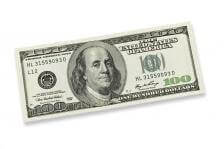Where to Stash Your Cash
The best options to keep cash safe, but still working hard for you.

Build Your Financial Moat
In the last episode I discussed the importance of building up an adequate emergency fund. I think about emergency funds as serving the same purpose as a moat that surrounds a fort or castle. This water-filled barrier fortifies and protects the structure from invaders. Emergency funds can help keep our household financially safe from harmful circumstances that might show up unannounced in the middle of the night as well.
The definition of an emergency is a sudden, unforeseen crisis that requires immediate action. So when we’re talking about money that you put aside for an emergency fund, there are some special considerations for the best way to handle those funds. If we’re ever faced with a situation such as the loss of a job or business, time is of the essence. Emergencies just can’t wait for a CD or bond to mature, or for you to sell a valuable asset. Emergencies also don’t want to hear that your cash may have shriveled up in a declining stock or mutual fund. The bottom line is that emergency reserves are a special kind of short-term savings fund that must be kept completely safe and secure for the unanticipated predicaments of life.
Emergency Fund Considerations
A useful emergency fund has three criteria:
-
It should be large enough to get you through the crisis
-
It should be easily accessible
-
It should be held in cash
So where can you stash your cash for the best combination of liquidity and safety? You could keep it in your mattress for the ultimate in accessibility. But that’s too accessible for most people. It might be too tempting to spend cash that you have sitting literally right under you! And remember that cash kept at your home is usually not protected against theft, fire, or other damage.
However, keeping a small percentage of your emergency funds at home can be a wise idea. Consider being prepared for a situation such as a natural disaster that could make getting to your cash difficult or impossible. For example, in a hurricane or flood, local banks could be temporarily closed. Or if there’s an ice storm that causes widespread power outage, ATMs near you may not be working. People who live in rural areas may have difficulty getting to banks during times of challenging weather. Mother Nature dishes out lots of reasons for us to keep a reasonable amount of emergency money in a safe place at home in order to survive her occasional tirades.
Make Emergency Funds Earn for You
For the majority of your funds, seek out the safety of an interest-bearing account at an FDIC-insured institution. This will keep your money federally protected and give you some interest income. Compare money market deposit accounts or other high-yield savings accounts offered by your local bank or credit union. Also check out national offers on bankrate.com.
Account Features to Compare
Here are some features to consider when evaluating different accounts to park your emergency money in:
-
Interest Rate. How much is the institution paying for the privilege of keeping your money on an annual basis?
-
Minimum Balance. Does the amount you can deposit right away qualify for a good interest rate?
-
Access Options. Can you get checks, a debit card, and move money online?
-
Number of Allowable Transactions. How many checks can you write per month or year? How about withdrawals or transfers?
-
Account Fees. What penalties or fees are charged?
Money Market Account vs. Fund
Remember that a money market deposit account is not the same as a money market fund. Money market funds are investments offered by mutual fund companies or brokerages. They invest in relatively safe securities such as U.S. treasury bills and certificates of deposit (CDs). Even though they may be offered by some banks, money market funds are not FDIC insured, and can not guarantee that your investment won’t decline. [[AdMiddle]
Money market deposit accounts, on the other hand, are more like savings accounts that offer limited features of checking accounts. They bear interest, but restrict the number of transactions to third parties to six per month. At most banks, only three of these transactions can be paid by check and the remaining three can be transfers or withdrawals.
The Big Picture
When it comes to an emergency fund, it’s best to ensure its safety and liquidity above all else. This will preserve your money so it’s there when you need it the most, even if the stock market is tumbling.
Administrative
I’m glad you’re listening. Chi-Ching, that’s all for now, courtesy of Money Girl, your guide to a richer life.
Hundred Dollar Bill image courtesy of Shutterstock


